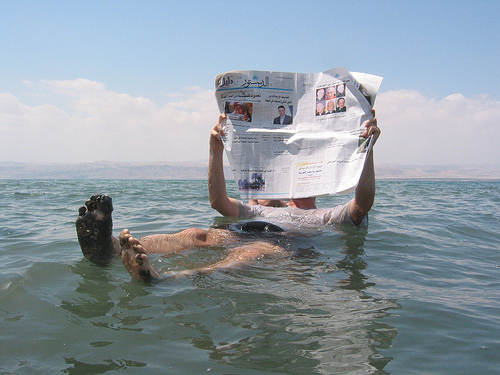Fixing the foreign correspondent web
How does the Internet affect the work of a foreign correspondent? That’s the question Andrew Stroehlein, a journalist and Communications Director for the International Crisis Group, discusses on the Reuters AlertNet blog. Andrew draws together a lot of current thinking and makes the point that it’s often impractical for a foreign correspondent to work effectively and monitor the Internet for relevant chatter about the story at the same time. He quotes Roger Cohen in the New York Times,
"You hear a great range of views about what you are writing, and some of those views can be exciting or interesting or lead you in new directions in terms of what you write and subjects you choose. My hesitation is that this is a temptation to somehow write into that noise and stir it further and be in the noise because it’s fun being in it, which I think can be a distraction."
In the 1990s, Mr. Cohen chronicled, in person, the horrors that accompanied Yugoslavia’s dissolution. Today, correspondents doing such work can find their time being sucked away by the profusion online of viewpoints and images and tweets from the scene, which multiply and demand attention. But keeping abreast of the Internet chatter is not the same as bearing witness.
"Instead of looking at a Bosnian village or hillside or being in a room with a group of concentration-camp survivors or bereaved women," Mr. Cohen said, "you would have just been staring at a screen and dealing with the rage of the Serbian diaspora in Munich or Los Angeles." link
This a definite problem. Journalists on the ground possibly with a shoddy Internet signal, no signal at all, no time to use the Internet, busy doing the job of journalism are still able to report effectively. The question is, what are they missing out on? Is there anything out there that could help the story along, a contact, a blog post, a source on Twitter?
Let’s be honest, most journalists are still a very long way from having the skills needed to filter the Internet in any meaningful, efficient and targetted manner. Google Alerts is about as sophisticated as it gets in my experience. There are three options ahead as I see it.
a) journalists are required to learn these skills and use them.
b) they are given a custom RSS feed for the particular story they are working on and are required to follow it as they would email.
c) the job of monitoring and filtering the Internet is done ‘back at base’ by someone else who only forwards the important stuff to the journalist in the field.
A major part of really understanding how the Internet works and how to use it as an integral part of journalism involves getting into the culture of it. And that culture is not for everyone. However, if a very unscientific poll of all the online journalism trainees I’ve trained over the years is anything to go by each one finds something of interest, something they decide to stick with and explore and incorporate into their work. That might be a blog, Twitter, a social network, RSS, social bookmarks or even Yahoo Pipes. In my experience, journalists only stick with something if they can learn it quickly and find it genuinely useful almost immediately. In an effort to help the sceptical, here’s a special offer for the first three commenters below.
If there’s a particular beat, a place, a niche topic you cover in your work and want to see what the Internet can deliver, but are not quite sure how to go about it, leave a comment stating exactly what it is you want to follow and I will create a custom RSS feed for you with the proviso that you get back to me to tell me if it is of any use, if it helps you in your work, if it took you down a path you might have otherwise missed.
Meanwhile, if you work for the BBC and are at TV Centre next Wednesday at 1.30pm I’ll be giving a talk on Twitter for journalists.
Photo Dead Sea Newspaper by Inju
